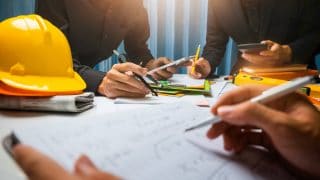
Construction project management is a specialized career that centers around overseeing the project plan and its execution. Oftentimes, the project management process begins in the design phase and continues through construction—and sometimes even beyond. Curious about a career in construction project management? Keep reading to find out what this career path entails and what steps you should take to get started.
What is construction project management?
Construction project management (CPM) entails overseeing the execution of a construction plan from start to finish. Project managers oversee multiple activities that happen simultaneously, each led by a specialist or team. Project managers may work with mechanical, electrical, and plumbing (MEP) contractors as well as drywall installers and framers. Project management is a concerted effort to coordinate all of those people to make sure the work is done on time, on budget, and in a safe manner.
There are typically three stages of construction project management once a bid is secured:
- Planning: The team members create a management plan outlining the schedule, costs, and project delivery method. Cloud-based construction project management software is usually used to track the required steps and progress.
- Project execution: Work begins and the project manager steps in to oversee project scheduling, cost control, and quality control.
- Completion: Once construction is finished, the project manager completes a project report and the final budget.
What does a construction project manager do?
Project managers have a lot within their purview. Here are the various things a project manager may have to juggle at any phase of the construction process.
Estimating and budgeting
Creating a budget for the project starts with understanding the full scope or work. From there, a project manager starts to get bids from contractors while mapping out a timeline. The project manager may also work with a construction estimator to estimate costs and put together a proposal for the client’s review.
As work moves forward, project managers must continually track spending and address any overages that occur. A project management team often has an accountant who keeps financial agreements on file and helps with the reconciliation process.
Scheduling
Scheduling the flow of work throughout a project is crucial in mitigating risk. Each phase of the project must be scheduled in relation to the others. Not only does this include lining up subcontractors, it also involves making sure materials are delivered at the right time and place. The construction project manager must track all of the tasks and problem solve anything that gets off track. There are multiple scheduling software options available, depending on the type of tasks you need to schedule. Some are better suited for repetitive projects, while others are designed to track projects with overlapping layers.
Organizing legal documents throughout construction
There are many legal considerations to track, especially during large projects. The project manager is typically responsible for recordkeeping, including tracking contracts and other legal documents. Here are the most common details that must be tracked, and potentially amended, during a project.
- Parties involved. This includes contractors, subcontractors, the project owner, and vendors.
- Contracts. Depending on the type of contract used and changes to the scope of the project, adjustments may need to be made.
- Insurance. The appropriate insurance policies must be maintained in order to keep everyone financially protected in case of injuries on the jobsite.
- Procurement. For large projects in particular, there may be regulations surrounding how materials and services are selected.
- Regulations. The project manager must be well-versed in federal and state laws and regulations to keep the project in compliance.
Safety
The construction industry has a lot more safety concerns than other fields a project manager may work in. From heavy loads to dangerous machinery, there is a lot of risk that must be mitigated. You may need to complete audits on the jobsite to make sure all of the proper safety procedures are being followed. Depending on the project team and scope, project managers may also need to conduct safety trainings and emergency drills.
Quality control & overseeing construction
Overseeing the project execution and quality control is a huge part of construction project management. Here is a sampling of some of the duties that may arise on the job:
- Create a quality control plan
- Help create construction plan
- Research and procure materials
- Track progress of contract requirements
Essential skills for construction project management
Here’s what you’ll need to succeed on the job.
Efficiency. As a project manager, you must work efficiently in a fast-paced environment, because so many different issues come up every day. The faster you get the job done, the more opportunities you have to move on and be more profitable as an organization.
Construction project management is a specialized career that centers around overseeing the project plan and its execution. Oftentimes, the project management process begins in the design phase and continues through construction—and sometimes even beyond. Curious about a career in construction project management? Keep reading to find out what this career path entails and what steps you should take to get started.
What is construction project management?
Construction project management (CPM) entails overseeing the execution of a construction plan from start to finish. Project managers oversee multiple activities that happen simultaneously, each led by a specialist or team. Project managers may work with mechanical, electrical, and plumbing (MEP) contractors as well as drywall installers and framers. Project management is a concerted effort to coordinate all of those people to make sure the work is done on time, on budget, and in a safe manner.
There are typically three stages of construction project management once a bid is secured:
- Planning: The team members create a management plan outlining the schedule, costs, and project delivery method. Cloud-based construction project management software is usually used to track the required steps and progress.
- Project execution: Work begins and the project manager steps in to oversee project scheduling, cost control, and quality control.
- Completion: Once construction is finished, the project manager completes a project report and the final budget.
What does a construction project manager do?
Project managers have a lot within their purview. Here are the various things a project manager may have to juggle at any phase of the construction process.
Estimating and budgeting
Creating a budget for the project starts with understanding the full scope or work. From there, a project manager starts to get bids from contractors while mapping out a timeline. The project manager may also work with a construction estimator to estimate costs and put together a proposal for the client’s review.
As work moves forward, project managers must continually track spending and address any overages that occur. A project management team often has an accountant who keeps financial agreements on file and helps with the reconciliation process.
Scheduling
Scheduling the flow of work throughout a project is crucial in mitigating risk. Each phase of the project must be scheduled in relation to the others. Not only does this include lining up subcontractors, it also involves making sure materials are delivered at the right time and place. The construction project manager must track all of the tasks and problem solve anything that gets off track. There are multiple scheduling software options available, depending on the type of tasks you need to schedule. Some are better suited for repetitive projects, while others are designed to track projects with overlapping layers.
Organizing legal documents throughout construction
There are many legal considerations to track, especially during large projects. The project manager is typically responsible for recordkeeping, including tracking contracts and other legal documents. Here are the most common details that must be tracked, and potentially amended, during a project.
- Parties involved. This includes contractors, subcontractors, the project owner, and vendors.
- Contracts. Depending on the type of contract used and changes to the scope of the project, adjustments may need to be made.
- Insurance. The appropriate insurance policies must be maintained in order to keep everyone financially protected in case of injuries on the jobsite.
- Procurement. For large projects in particular, there may be regulations surrounding how materials and services are selected.
- Regulations. The project manager must be well-versed in federal and state laws and regulations to keep the project in compliance.
Safety
The construction industry has a lot more safety concerns than other fields a project manager may work in. From heavy loads to dangerous machinery, there is a lot of risk that must be mitigated. You may need to complete audits on the jobsite to make sure all of the proper safety procedures are being followed. Depending on the project team and scope, project managers may also need to conduct safety trainings and emergency drills.
Quality control & overseeing construction
Overseeing the project execution and quality control is a huge part of construction project management. Here is a sampling of some of the duties that may arise on the job:
- Create a quality control plan
- Help create construction plan
- Research and procure materials
- Track progress of contract requirements
Essential skills for construction project management
Here’s what you’ll need to succeed on the job.
Efficiency. As a project manager, you must work efficiently in a fast-paced environment, because so many different issues come up every day. The faster you get the job done, the more opportunities you have to move on and be more profitable as an organization.
Decisiveness. You need to make a lot of decisions when overseeing a construction project. Avoid having paralysis by analysis, meaning don’t overthink a situation so much that you never make a decision. Instead, determine what the best approach would be, either on your own or by consulting a team member with more experience.
Flexibility. Construction project managers have a variety of people and activities to oversee; being flexible helps you manage those processes more easily, especially when there are individuals with different temperaments in a project. Be flexible as long as it’s within what you can do to move the project forward.
Communication. Both verbal and written skills are required for this career path. Clarity is essential for success. Project managers must be able to write clear, concise emails and prepare documentation and reports.
Curiosity. There are a lot of people who love one particular trade and gain a sense of confidence knowing that specialized area. But in project management, you need to know a little bit about a lot of different areas. That way you know what needs to be done and what quality metrics should be in place. Being curious helps you ask the right questions when communicating with subcontractors.
How to become a CPM
The U.S. Bureau of Labor Statistics outlines three specific steps it takes to become a construction project manager.
- Earn a relevant degree
A Bachelor’s degree is typically required to become a construction project manager. Common areas of study include construction, engineering, or business. It could also be helpful to take some coursework or get certified in project management. You may also be able to enroll in an associate’s degree program if you have work experience in the construction industry.
- Enroll in a training program
If you don’t already have work experience on a construction site, you may need to enter a training program. Many construction companies offer them so you can get on-the-job experience as a junior member of a project team. You can also apply for internships in the field while still working on your degree.
- Check state licensing requirements
Each state has its own regulations concerning licensing for construction project managers. Check with your state to see if you need to take any type of exam or continuing education courses to qualify. It can also be helpful to earn a professional certification simply for the sake of career advancement. The Construction Management Association of America offers a certified construction manager (CCM) credential to those who pass an exam. Topics covered include risk management and legal issues.
Construction project management is an exciting career path for individuals with a passion for the industry and the ability to juggle multiple responsibilities at once.
MT Copeland offers video-based online classes that give you a foundation in construction fundamentals with real-world applications, like the basics of construction project management. Classes include professionally produced videos taught by practicing craftspeople, and supplementary downloads like quizzes, blueprints, and other materials to help you master the skills.







